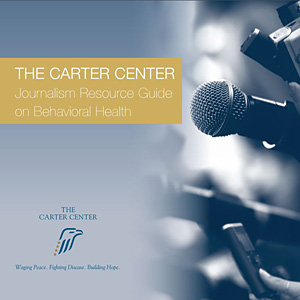Coaching for Journalists Reporting on Mental Health
The Carter Center’s Mental Health Journalism fellows and journalists trained by our experts in effective mental health reporting are offering free one-on-one assistance to reporters covering related topics.
Whether you’re digging deep into addiction, navigating getting info for your mental health stories or checking on the best language to use that doesn’t inadvertently promote stigma or stereotypes, this resource is for you.
Language Guide for Reporting on Mental Health
If you’re a journalist on deadline, we recommend you check out our free guide.
Our Mentors
Volunteer mentors are alumni of The Rosalynn Carter Fellowships for Mental Health Journalism. They’re journalists who have been trained in mental health reporting and who have deep experience in mental health reporting, too. Our mentors provide guidance on reporting accurately and effectively on mental health and their areas of expertise.
Some tips to make the most of it:
- Plan ahead what you’d like to address. What topic are you interested in? What are your challenges? What do you need to know to report on it?
- Be respectful of your mentor’s time. Mentorship is voluntary and the people participating are busy journalists! If you need to reschedule or cancel, give them a heads-up well in advance.
- End your session with a game plan. Identify next steps, set a deadline for execution or follow-up.
Our mentorship program is for journalists or people working directly in journalism. Liberian journalist mentors also provide mentorship to student journalists in West Africa. If you have questions about the mental health journalism fellowships, please email carterfellows@cartercenter.org. For mental health programming, contact The Carter Center’s Mental Program at
Yes, you can. It all depends on coaches’ availability and willingness, their areas of expertise and your needs.
If you can’t make your mentorship session, please be respectful of your coach’s time and give them a heads-up as far in advance as possible. All mentors are volunteers and block off valuable time to mentor you. Life happens. But courtesy is important.
All of the mentors are alumni of The Rosalynn Carter Fellowships for Mental Health Journalism—the highly-competitive, yearlong, non-residential fellowship for journalists from the United States, Colombia, Qatar, and the United Arab Emirates to report on a mental health topic of their choice. Mentors are journalists who have been trained in mental health reporting and who have deep experience in mental health reporting. The mentors are all doing this on a volunteer basis.
Language guide for reporting on mental health
The Carter Center Journalism Resource Guide on Behavioral Health (pdf) supports journalists’ efforts to report accurately and effectively behavioral health issues, including addiction and substance use, in ways that do not reinforce stereotypes and stigma.
-
Search Rosalynn Carter Fellows past and present and browse their fellowship projects.
-
Find training opportunities, key mental health organizations & centers, governmental resources, important publications, and more.
-
From the National Child Traumatic Stress Network




